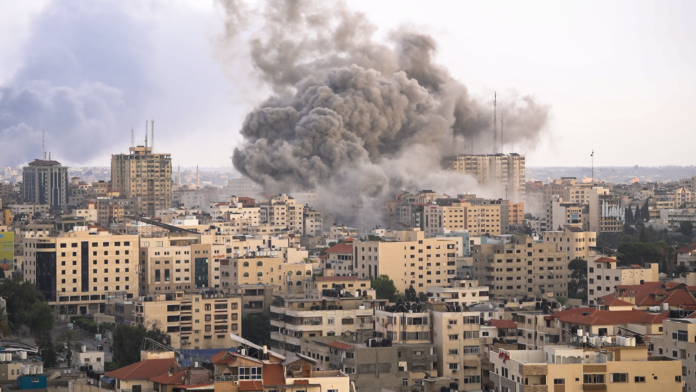
The ceasefire between Israel and Hamas, brokered earlier this month under a U.S.-led plan, is under renewed strain following Israeli air and artillery strikes on southern Gaza on Sunday. The Israeli military said the attacks targeted what it described as “terrorist infrastructure” after claiming its soldiers came under fire from Hamas in Rafah.
According to the Israel Defense Forces (IDF), troops operating east of the so-called “yellow line” were hit by a rocket-propelled grenade and sniper fire. An Israeli official called the incident “a violation of the ceasefire” and said it prompted immediate retaliation. Prime Minister Benjamin Netanyahu held security consultations and directed the army to act “forcefully against terrorist targets” but stopped short of declaring a full return to combat.
Hamas denied involvement, saying it “remains fully committed” to the truce across all areas of the Gaza Strip. Its armed wing, the Ezzedine al-Qassam Brigades, claimed it had no communication with fighters in the Rafah zone, calling it an area under Israeli control since the resumption of conflict earlier this year.
The strikes came as Israel confirmed recovering the remains of two hostages overnight, while Hamas said talks for the second phase of the ceasefire agreement had begun. Under the deal’s first phase, Hamas released 20 living hostages and 12 bodies, while Israel freed nearly 2,000 Palestinian prisoners, including several serving life sentences. Israel has also returned the bodies of 150 Palestinians, though officials have not provided details about the causes of death.
Meanwhile, Gaza’s Health Ministry reported that eight Palestinians were killed in Israeli attacks over the past 24 hours, including airstrikes in central and southern Gaza. Medical sources said six people were killed in al-Zawaida and three in Nuseirat. Journalists and displaced civilians were among those reported dead.
In Washington, the U.S. State Department said it had received credible intelligence suggesting Hamas may be planning attacks on Palestinian civilians in Gaza. The department called such actions a “grave breach” of the ceasefire if confirmed. Hamas dismissed the claims as “false allegations” and accused Israel of supporting armed groups within its zones of control.
The Rafah border crossing between Gaza and Egypt remains closed. Netanyahu’s office said it would stay shut “until further notice,” tying its reopening to Hamas fulfilling obligations to return all remaining hostage remains. Israeli media reports indicate that the bodies of 16 hostages, including two foreign nationals, are still unaccounted for.
Tensions are rising within Gaza amid fears of internal clashes between Hamas and rival factions. Some residents have accused Israel of backing armed groups to challenge Hamas’s control, an allegation Israel has not addressed directly. Analysts warn that without an international monitoring presence or a long-term security mechanism, the truce could unravel.
As of Sunday evening, explosions continued to be heard in Rafah and central Gaza. Many residents said the brief calm that followed the ceasefire has given way to new uncertainty, as both sides exchange accusations and the fragile truce edges closer to collapse.
Image is licensed under the Creative Commons Attribution-Share Alike 4.0 International license and was created by Jaber Jehad Badwan.